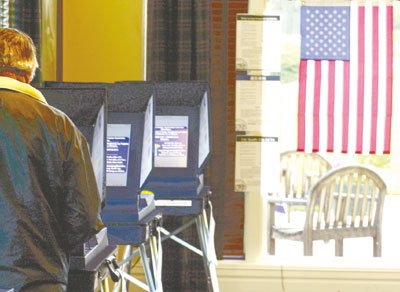After four years of voting on touch-screen ballot machines, the
state’s top election official will force county voters and most
other Californians to once again rely on paper ballots.
Morgan Hill – After four years of voting on touch-screen ballot machines, the state’s top election official will force county voters and most other Californians to once again rely on paper ballots.
Starting with the February 2008 presidential primary, Santa Clara County residents and most other Californians will be forced to use paper ballots in response to a statewide decertification of direct recording electronic voting systems, or DREs. The order from California Secretary of State Debra Bowen comes in response to security flaws discovered in touch-screen voting machines, including thousands of the variety sold to the county by Sequoia Voting Systems, of Oakland.
Of the roughly 5,500 touch-screen machines now used in Santa Clara County, only 800 to 1,000 of them will be deployed next year as a result of the order, which allows a single machine at each polling site to accommodate disabled voters (as well as any other voters who insist on voting electronically).
While not banning touch-screen voting outright, Bowen is thinning the ranks of the machines at a time of growing national concern about the security of electronic voting.
“Sequoia was one of the most problematic systems,” said Bowen’s spokeswoman Nicole Winger, referring to software flaws that allowed a team of computer experts to change vote counts and infect other voting machines with malicious code.
The company in late July issued a scathing denunciation of the findings as an “unrealistic” evaluation conducted in a laboratory by computer experts with “unfettered access” over several weeks to the machines and software.
“This is about security and accuracy in elections,” Winger said. “Secretary Bowen, as the chief elections officer, has the responsibility to review all of the voting systems in elections. The law says if those systems are found to be defective or unacceptable, the secretary of state can withdraw certification.”
Bowen’s authority hasn’t stopped county supervisors from investigating a possible lawsuit against the state. Tuesday, supervisors directed county counsel to explore potential legal action to recover the estimated $500,000 cost of purchasing two additional paper-ballot scanners, and to offset millions of dollars worth of equipment rendered obsolete.
“We’ve spent $19 million on voting machines,” said Santa Clara County Supervisor Don Gage, who represents South County. “They were certified and we added a paper trail and did all the things we were supposed to do, and now the state turns around and tells us we can’t use them … It just doesn’t make any sense to waste all that money.”
The county began using the Sequoia machines in 2003 and added a voter-verifiable paper trail in time for the 2004 presidential election.
Santa Clara County Registrar of Voters Jesse Durazo and other county officials warned in a Wednesday press announcement that returning to paper ballots will also mean delays in reporting election results. Still, county officials are taking the state mandate as an opportunity to promote absentee voting, which they have newly dubbed “vote by mail.”
“I’m on a mission,” Durazo said, “and my mission is to provide a good experience in voting, with early results and a minimum of discomfort to our voters.”
County residents will have three ways to cast a ballot starting in 2008, according to a county press announcement. They can “wait in line” at each polling site; drop off absentee ballots at a polling location; or join the growing number of people who mail in ballots prior to election day.
Out of 673,000 registered county voters, 320,000 have signed up as permanent absentee voters, according to the registrar. Durazo expects half of a projected 750,000 registered voters to cast mail-in ballots in the February 2008 election.
On the state level, 75 percent of Californians already vote on some form of paper, according to Winger.
The use of paper ballots will not be a jarring change for many local voters who have remained faithful to paper ballots, according to Shawna Freels, Gilroy’s new city clerk who formerly oversaw absentee voting in San Benito County.
“I think there’s that percent of the population, like my father for instance, who just won’t use an ATM card,” she said. “There are some folks that just don’t want to touch a machine.”














